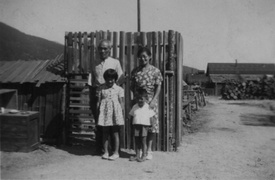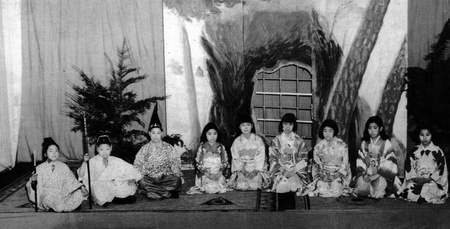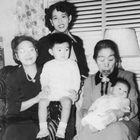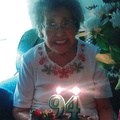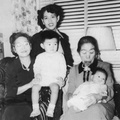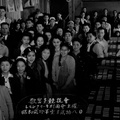The only pleasure Frank used to have during these hard times was going fishing down Gore Avenue to make a few pennies selling the catch – a bucketful of “shiner perch” - to Japanese restaurants. “Tengu” was one of them, owners of which were grandparents of my current good friend, Pat. Frank used to scrape barnacles off posts protruding from the water down at the wharf, inside of which were worms that made the best bait. I remember the times he had asked us girls to go down to the docks early and scrape the barnacles off and get the worms ready for him to fish. I remember we didn't like touching the slimy worms and failed to get any for him and it ruined the day for him. Was he ever annoyed with us girls!
According to Frank, he also did not have any pleasurable time growing up as being the only son for the longest time (Kenny being born in 1940, too much of an age difference to be a pal). We girls seemed to stick together and “nokemono” him. He said that since Mom was busy with the barbershop and he being the oldest, he used to look after Mary, taking her around in her buggy while Mom was busy with her barbering business. Frank did go strawberry picking during the summer months, also going hop-picking which was not a profitable job as the workers were paid by the weight of the hops which did not weigh much.
I remember one year Frank travelled North on a steamship to join Dad to help with his fishing. Dad mentioned, jokingly, when he returned after fishing season that he wondered who the Indian boy who resembled his son approaching him was when he realized it was Frank! I guess you could say that he had a sense of humour.
Uncle Kanichi married Nuiko Nakano whose family lived in Haney (the current Maple Ridge) so I was able to travel by car to her home which I thought was a great adventure, staying overnight away from home. Probably Haney is not that far from Vancouver but in those days going out of town was a treat.
It was not all drudgery even in those days. We were able to go picnicking, swimming, cherry-blossom viewing by travelling by streetcars to Stanley Park, English Bay, Kitsilano Beach, and Spanish Bank. During the Labour Day Weekend, we went to Hastings Park with 50 cents (one-day’s spending money at the Ex). If we were careful, it lasted the whole day.
I also remember seeing a snapshot of Mom and myself in a park in North Vancouver where we must have gone on the ferry to pick ‘warabi’ (fiddlesticks). We used to pick quite a lot so that Mom could wash and dry them to cook during the winter months.
I recall taking the younger ones to an outdoor swimming pool in mid-Vancouver, where many children gathered for an afternoon of swimming. Looking back now, it must have been very unsanitary with all those young children doing things in the swimming pool, which the health authorities would rather not know! If my memory serves me right, there was a building nearby where the worshippers of Nichiren (part of the Buddhist religion) conducted their service.
We made weekly visits to the movies for 5 cents admission at the Star Theater, which was situated on Main Street, a few doors from a jeweller operated by a Mr. Kawai. (He had a brother in the same business a block north of his store.) One of his daughters, Toshiko, who was in my class in Japanese school, keeps in touch with me by phone in Toronto.
Japanese movies were shown at the Japanese Language School Auditorium which I must admit I enjoyed very much. It was run by a Mr. Tsuyuki who took the role of all the characters of the silent movies, changing the tone of his voice to portray different performers. It was amazing how skillful he was making the characters come to life.
There were stage shows, concerts performed by the Japanese School alumni, something similar to the one we did of Monju No Hime in our senior year. The girls and I had nerve enough to make up our own odori which we got to perform. Even at the school concert, Mom got involved in the make-up and dressing of the performers.
Once a year, annually, Uncle Ishikawa who owned quite a large collector’s boat took families and friends out on a day’s excursion out to sea, dropping anchor in shallow areas for clam digging, chasing small crabs, an outing enjoyed by all. I thought the boat looked grand, but reminiscing now, it could have seen better days.
There were memorable events we managed to experience from time to time. Prince and Princess Chichibu of Japan, he being the brother of the Emperor at that time, were travelling to London, England, to attend the coronation of King George VI, and visited our Japanese School on their way. In those days, Japanese royalty was treated almost god-like; and the students who were lined along the streets outside the school, had to keep their heads bowed until the Imperial Highnesses passed them on their way into the interior of the school where the upper-grade students had congregated. On that day I was honoured to have my essay on display in one of the classrooms.
About a year later, King George VI and Queen Elizabeth made a journey to Canada and their route took them down Main Street. I was of the opinion that Mary should not miss seeing royalty so I grabbed her up in my arms, ran down Main Street, stopped in front of Matsui's bicycle shop so that she would not miss the memorable occasion. She would not remember as she was only about six months old! Betty and Shirley were somewhere in Vancouver dressed in kimono welcoming the royal couple.
We kept a close relationship with the Kitagawas, who lived in the Fairview area of Vancouver. I think Mr. Tsuneya Kitagawa worked at the sawmill. Mrs. Yae was the daughter of Grandfather’s sister (formerly Takemura) and she called Mom neh-san (older sister) all her life. I remember I envied Emiko, their daughter that they were able to buy her a Shirley Temple doll when it was popular among young girls. Our relationship was close enough to occasionally have sleep-overs.
Across from them in Fairview lived the Fujiis, Mom’s mother’s family. Mrs. Fujii was very good at cooking Japanese cuisine and we loved getting invited for numerous dinners. There were quite a number of Japanese families living in the Fairview area.
Dad was not a very sociable person. He, I am sure, felt bad about not making a decent living to support so many mouths to feed but he tried awfully hard attempting so many ventures, but he was unlucky. He started so many cleaning/pressing businesses at so many locations; none panned out. He knew Mom worked hard to keep the family together and he must have appreciated Mom's efforts although he did not come out and say so.
It must have been difficult for Dad to make the transitions, from a seasonal fisherman to that of a cleaning/pressing business, and to an hourly wage earner for a box factory operated by a Mr. Shoji, a Japanese businessman. Dad had opened up a cleaning/pressing business in the Kingsway area with Yae Kitagawa; another one on Oak Street with Aunt Yuki and, of course, the original one on Powell Street. I guess he may not have had a strong business sense or was just unlucky in his ventures.
I remember seeing Dad doing family laundry in the back of the house. He must have felt it demeaning, being born the eldest of a well-to-do family to come down to this. I remember taking the younger siblings to the corner of Gore Ave and Cordova Street meeting Dad coming home from his factory work, hoping the gesture would somehow alleviate his fatigue from his daily work.
I can remember one Christmas, Dad tried awfully hard to make a doll stroller for Mary, carefully bending soft plywood for the back, twisting a strong wire for the handle. Also, a box of tea sets was Santa’s gift for one of the girls which she treasured (as Ken was ecstatic with one red locomotive in Lemon Creek which he found on Christmas morning which, unknown to him, came from an Eaton’s catalogue.)
Mom worked hard all her life, first supporting her father, then marrying a much older man which made her life not much easier with a big family following. With one daughter with a problem, another suffering with a chronic illness, Mom had a rough time. She must have suffered anxiety throughout her life but I never heard her complain. After Dad passed away, she had more leisure time to call her own, travelled a little, indulged in Japanese culture, like shamisen with her friends, and cooking up a storm.
Thinking to improve and refine their way of life, they had no choice. With the start of the war and impending evacuation to an unknown place in the province, they could only plan for the immediate future. I remember Mom and Dad sitting in the living room, both of them busy knitting warm outfits preparing for cold weather. As Dad was an older person and Frank not having reached 18 years of age, they were not called to be shipped to road camps.
Almost a year after the war started and evacuation of the Japanese from the B.C. coast became imminent, people who could afford it decided to move on their own without governmental order at their own expense. Our cousins, the Ishikawas, were able to move to an Alberta sugar beet farm with the family. I think Uncle Kanichi and his family with Aunt’s family moved to Christina Lake, and Uncle Gengo and his family went to Tashme, the government’s last relocation centre to be completed.
Mom and Dad decided to take the initiative and move on their own at the government’s expense before the authorities ordered them to. We did not have any possessions to declare, except an old radio/gramophone unit. Mom was able to store the old traditional Japanese dishes at a relative’s storage place (which were returned to us after the war). We packed up and left our current premises, leaving behind the barbershop chair, accessories, the hot-water system we installed. I don’t know how they did it, but we were at the relocation centre at Hastings Park the next day. I don’t recall seeing a moving van or any kind of truck transporting our belongings since there was not much. I have heard that people were astonished with our move - one day there was a well-equipped barber shop, the next day an empty shop.
At Hastings Park, we were allotted a space in the building in the Women’s section, Dad and Frank were in the Men’s area. The first meal they served us was breakfast, which included scrambled eggs. We were surprised and happy as we never had eggs for breakfast when we were on our own. We did, however, change our mind about being happy after our first taste.
We spent about a month in Hastings Park. I don’t know how we spent our days during that time as schools were out for the summer, and no activities were planned. I guess we awaited orders to move out to the interior of the Province which did come in about a month’s time. There must have been much going on in that month with people from Vancouver Island and the Northwest coast of British Columbia having to move out of their communities to Hastings Park awaiting their orders.
About the end of August we did receive orders to move out. Packing again for the move, I lost my perception of time and distance about this time. I do not recall how long the journey took, how far we had to travel, although it was an adventure not having travelled on a train before. I do not recall how many cars were used in this move, or how many days. I am sure we stopped at Greenwood to let some people off; and, then on to Grand Forks. I don’t remember whether this was a self-supporting community or not but we saw many Japanese who had made it to this location previously. We then travelled on to Slocan City, a place which once was a thriving mining town.There were still several wooden buildings near the station, presumably the residence of former citizens.
There was an area where several tents were standing, temporary sleeping accommodations for people who had arrived from the coast. After observing the “tent city” we moved a few miles away to an area called Popoff, where there were two large bunkhouses. These also were temporary shelters. We were given a couple of rooms for sleeping. There was a tent where meals were served (we either had our meals at the tent or cooked our own as there was a stove in the communal kitchen in the bunkhouse.) I think Popoff is where a Japanese family opened a store making/selling tofu, age, miso, even after the war.
After a few days’ stay, another move. We were informed that we were being sent another few miles further away – to Lemon Creek - a total about six or seven miles from the City. We were told that this new location will be provided with electricity sooner than other locations as it was nearer to a city that already had electricity. This did not happen; we spent the entire stay in Lemon Creek without electricity. First, we used kerosene lamps with oil provided; later, on our own initiative we acquired gas lamps which were much brighter. It was a community with rows of houses/cabins built by men who had been relocated there earlier. We were allotted a whole house to ourselves because of the total number of people in the family, with smaller families having to share accommodations.
We did not appreciate it then but the place was actually beautiful. At the edge of the settlement ran a highway with cars and trucks travelling quite busily, and on the other side of the road were beaches. I guess some did go swimming, although we didn’t. Not being able to stand this kind of life, Frank decided to set out on his own to travel east across Canada. Toronto was forbidden to the Japanese so his destination was Hamilton. A Japanese couple, Mr. and Mrs. Tabata had opened and operated a boarding house for young men without their families.
Mom, with her ingenuity and foresight before we left Vancouver, decided to acquire a lighter version of a barber chair, packed it and brought it along with a large kitchen range. She surmised that people needed haircuts wherever they lived and she was right. She had a corner of the house partitioned off into a barber shop and did make a few extra dollars doing haircuts. Not big business, but enough to keep her busy.
We had a house on Holly Street - all the streets were named after some sort of trees - Elm, Fir, Cedar, etc. A house across from ours was designated a community office “hakko-kai”, and a large mess tent was set up in earlier days where we may have been served with meals, with a medical centre located not too much farther away.
Dad had a job as a bathhouse attendant which involved making sure that enough hot water was available all day, close up the premises at the end of the day by cleaning the tub, scrubbing the stools, pails, etc. I remember helping him with the cleaning at the end of the day as I did not use the bathhouse earlier until people had left. He had a partner, Mr. Yoshinaka, doing the same work.
Eventually schools were built, so were places of worship, both Christian and Buddhist. A lot of young evacuee girls worked as school teachers, teaching Grades 1 to 8. Higher grades were initially provided in the public school building. This is where I met the first friendly person, Fumiko Takahashi, who became one of the teachers at the kindergarten run by the United Church where Ken attended. Fumiko remained my friend throughout our lives, but sadly passed away at a relatively young age in Toronto.
The United Church organization had a school built at the far end of the community to serve as a high school. Miss Hamilton was head of the high school. Miss Herd the English teacher, Mr. Ebisuzaki took over the business courses. There were other instructors teaching different subjects. Since I took the business course – bookkeeping, shorthand, typing - I needed a typewriter for my class which I had to ask Frank for. First, he sent me an old-fashioned one which did not have the keys in the proper places; he replaced it with a brand new Remington portable. I guess I owe Frank my career as I was able to continue with my business course.
Many of my fellow high school students later relocated to Eastern Canada or returned to the Coast when it was permitted (1949). One of my classmates, Mas Yamamoto, years later married my cousin Michiyo (Joan) when both families returned to Vancouver.
Unexpectedly, our cousins who had moved to the Alberta sugar beet farm turned up in Lemon Creek, was given a house not too far from us, allowed to stay for a week, then was moved to Rosebery, a few miles north of New Denver where they stayed until the end of the war.
Earlier, soon after the outbreak of the war, the Japanese militia was doing well and to show off their might, the Japanese government donated to the residents at many settlements shoyu, rice, miso, etc. I had no inkling what most of the people made of this gesture, where their loyalty lay, as they all cheered to show their appreciation.
© 2021 Kay Mende


